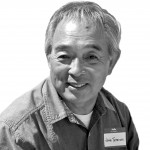I remember one day in camp, something terrible had happened. There was a buzz going on all over, and wherever you went around the camp, you would see the adults in small groups murmuring, whispering as if some great secret had been found out.
Some were crying. They all tried to hide their fear.
I don’t remember much else about that day other than those whispered conversations. Any semblance of normalcy was gone, the laughter was gone, and we kids knew some terrible event had taken place somewhere distant. It wasn’t until a while later that I learned about Hiroshima and Nagasaki, but I couldn’t comprehend the magnitude of it all. To me, a bomb was a bomb, just like the ones we used to see in war movies.
But soon enough, we all came to understand what Hiroshima and Nagasaki were all about and what had happened there. My family’s ties go back to Shimane and Yamaguchi kens, and we lost no relatives in the two cities that had been obliterated. But after the war, periodically we sent what we called care packages to Japan to relatives I never met and to people whose names didn’t sound even vaguely familiar. That’s what you did if you were Japanese American; you cared for the people who, not long before, were our nation’s enemy, the people who looked like you and with whom you were inextricably tied through race if not experience.
In many ways, I felt in those years like we never escaped the shadow of that mushroom cloud. After being free of the tyranny of our imprisonment, we learned as kids in school to fear the Russians and the Bomb, as it was called (they have the Bomb too, we were told). In those days, it was the atom bomb; the word nuclear(ITAL) was not yet part of our everyday lexicon of fear.
For a few years after the war, we would hear our parents now and then mention Hiroshima and how terrible it was for the kind of devastation it had wrecked on Japan’s spirit and soul. That was our connection, its unimaginable power and destructive force and the obliteration of two entire cities and the vaporization of the Japanese in those cities: that was our relationship with what occurred at the end of the war.
I think for us Japanese American kids, the idea of the atomic bomb had a kind of significance our white schoolmates couldn’t possibly have understood. I don’t know that even we fully understood or appreciated its significance for our families or our community. In some perverted way, what the bomb represented for me was a sense of guilt for being like the people it killed, looking like the enemy when my teachers and white schoolmates had no such resemblance to the unknown enemy. I suppose that was one of the cruelties of being too young to understand the guilt others placed on me. People who looked like them dropped the bomb on people who looked like me, and for that I somehow felt guilty. Go figure.
It’s not like I thought about these things all the time or even much at all. But the atomic bomb came to have a presence in our lives as the Cold War with Russia grew after WWII, creating a sense of paranoia in this country. As kids, we were taught bomb drills — teachers would suddenly shout in class, “Drop!” and we would dive under our little desks into a fetal position, with our hands covering the back of our necks, eyes closed tight . . . as if that would help us survive the sudden flash of blinding light and intense heat as a nuclear bomb dropped close enough to vaporize us and send our little souls into obliteration.
It was like a game for us, kind of like Musical Chairs. Soon, it became a competition between my friends and me to see who could react the quickest. So all through the day, we sat there anticipating when the teacher would say the magic word, completely distracted from the lessons being taught. It was more important to learn to read the signs, to figure out, for example, that it was usually when the teacher had her back to the class. That was the tell, the give-away, especially if she was writing something on the blackboard. Some of us would be half way out of our seats, ready to dive, more attentive to every twitch of muscle on our teacher’s body than to what she was saying or trying to teach us. And, of course, you’d feel pretty stupid if you dove under your desk anticipating the command when the teacher said nothing. That would always get you an amused look from the teacher and the ribbing from your classmates for the rest of the day.
In looking back on the years of the Cold War, I realize it was a kind of cultural lesson we learned, a culture of fear and paranoia and distrust. One thing I was glad of was that the Russians were now the bad guys instead of us. Boy, was that a relief! “Those dirty Japs” was replaced with “those dirty commies,” and you can bet your bootie that I joined in on that chorus. And why not? Being the bad guy was tough on a kid.
John Tateishi is a former JACL National Director.
Originally published on May 16, 2014




